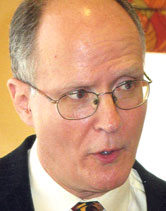Public school chief sees benefits to parochial ed
Former Chicago Public Schools CEO Paul G. Vallas has learned a lot from Catholic schools—both as a student and educational administrator. Vallas, who led the Chicago schools from 1995 to 2001 returned from Philadelphia, where he now serves as school CEO to speak to Catholic school leaders at a Tinley Park forum in June held by Saint Xavier University’s Bishop John R. Gorman Institute for Leadership in Catholic Education.
After he touted many of the reforms he implemented in Chicago and is bringing to Philadelphia—smaller schools, kindergarten through eighth-grade elementary schools, an emphasis on character and values—one listener commented that they sound a lot like what Catholic schools have always done.
Vallas’ appearance drew wide media attention, as supporters have asked the Illinois courts to resolve his residency status, sparking speculation that he is planning a second run for the governor’s office, but he told the audience that he intends to finish out the last two years of his contract in Philadelphia, taking him out of the running for the 2006 race. Illinois law requires that gubernatorial candidates live in the state for three years before the election.
Staff writer Michelle Martin caught up to him before his talk.
The Catholic New World: What can Catholic schools learn from public schools and vice versa?
Paul G. Vallas: I went to Catholic schools and public schools. I went to Greek Orthodox parochial school and to Holy Rosary Irish, which was the parochial school in Roseland, and of course I went to public school.
The things that I’ve learned from my experience working with Catholic schools and parochial institutions is the importance of having faith-based partnerships. Faith-based partnerships are a tremendous resource for public institutions and in values education, and I’ve tried to replicate that.
In Philadelphia, we have about 170 schools with faith-based partners.
TCNW: Explain how that works. What do they do?
PGV: They do crisis intervention, they do counseling, they run clubs, they do mentoring and tutoring. They also help us with school behavior problems. A lot of our faith-based partners have Saturday programs for kids who are disruptive, the kids who haven’t committed an offense serious enough to be expelled. You don’t want to be suspending kids all the time because for some of them, they love to be suspended. So we have the faith-based institutions do Saturday character-education programs. Also, the faith-based organizations sponsor things like Gospel choirs, prayer clubs, Bible clubs, which they can do as long as they are voluntary activities. But they’re in the schools as after school, extended-day activities.
There’s also a law in Pennsylvania for faith-based removal time, which allows for schools to release children for faith-based services during the school day for 36 hours during the school year, so they can participate in things like that.
So it’s more than just an adopt-a-school program. The faith-based institutions, many of them are immersed in the schools.
TCNW: You’re talking to Catholic educators here. What’s the role of a parochial school system?
PGV: Let me mention the other thing I learned from parochial schools. That’s the importance of values and character education, incorporating values and character education into the curriculum, having activities for organizations and associations that promote values and character education, and requiring community service. In Philadelphia, community service is a requirement for graduation.
My approach is not to view parochial schools and public schools as the enemy or opponents, in competition with each other. I will support anything that benefits parochial and private schools. I don’t view it as a zero-sum game, what benefits you doesn’t benefit us, what helps you hurts us. I’ve always thought that the heyday for the public schools also was the heyday for the parochial schools. When you have a decaying public school system, it undermines neighborhoods. When neighborhoods are undermined, it undermines the faith-based institutions, the churches. And when the churches are hurt, financially, their membership dwindles, and they can’t support the parochial schools. What hurts one ultimately hurts the other.
I’m a firm believer that we should be finding ways to subsidize and support all of our educational institutions, whether faith-based or not.
TCNW: So you think there should be some public funding for parochial schools?
PGV: Yes, I think parochial schools should have access to public funding—school construction programs, textbook support, transportation support, things of that nature. I think there’s a lot of funding that should be allocated. I think the federal government has a role to play in funding for parochial and private schools—as long as it’s not at the expense of the public schools. That’s why the public educators get so defensive; it’s almost like, “we’re going to take some of your money and give it to them.”
TCNW: You haven’t mentioned the v-word ... vouchers.
PGV: That’s right. First of all, I don’t oppose vouchers. I just don’t think vouchers are going to solve the problem.
A lot of parochial institutions would be reluctant to embrace vouchers if the mandates came with them. A lot of parochial schools still want to be selective in who they take. They don’t want to have to conform to all the mandates that public schools conform to. With a voucher system, if you had the mandates, I think few institutions would be interested in participating in that system.
But there are ways to provide real meaningful and substantive support for parochial and private schools short of a voucher system.







